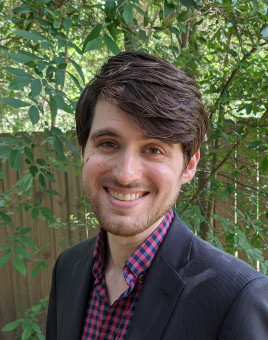
Devin Fitzpatrick
Visiting Assistant Professor
Mondays 9:20-11:20 AM and 3-4 PM
I am always glad to discuss philosophy with any interested students. When not philosophizing, my hobbies include visiting Portland’s teahouses to try new teas, dancing, coding text-based computer games, and petting our cats, Purrcival and Pepita.
Specialty
Ethics, Philosophy of Mind, Philosophy of Science, Social and Political PhilosophyAcademic Credentials
PhD, Philosophy, University of Oregon, Eugene, OR (2022)
MA, Philosophy, New School for Social Research, New York, NY (2014)
BA, Philosophy, University of California Berkeley, Berkeley, CA (2008)
Teaching
CORE 121: Procedural Ethics and Moral Machines
Research
The central theme of my research is personalization: its possibility, value, and risks in ethics, politics, and technology. My dissertation, “Ethics for the Depressed: A Value Ethics of Engagement,” investigates the possibility of personalizing ethical theory in contexts of limited autonomy. I argue that depressed persons suffer from “existential guilt,” which amounts to a two-part compulsion: 1) the compulsive assertion or sense of a vague and all-encompassing or absolute threat that disrupts action and intention formation, and 2) the compulsive taking of such disruption to be a reason for inaction. I develop in response an “ethics for the depressed,” an ethical theory directed to those suffering from existential guilt. I challenge the standard account of depressive loss of motivation as being a loss of desires and argue instead that it involves the defeating presence of what the phenomenologist Matthew Ratcliffe calls “pre-intentional” mental states, a category that I redefine to include “quasi-beliefs” and habits of feeling, that interfere with intention formation and action despite the persistence of desire. Demonstrating that depressed persons may retain their desires and values in depression, I then premise a value ethics tailored to the depressed upon what I call the consistent desire for a “sense of stability” in response to experiences of precarity and isolation. I then extend the concept of the pre-intentional to the phenomenology of value, developing the concept of “felt values” or intuitive value paradigms that are pre-intentional states as a starting point for collective ethical deliberation. I thus put an orthodox style of philosophy in service of an unorthodox agent: one who is “aspiringly autonomous.”
My recent publications further develop the central concepts I introduce in my dissertation. In “The Pre-Intentional, Existential Feelings, and Existential Dispositions” (Phenomenology and the Cognitive Sciences, 2023), I argue pre-intentional states should be understood as “existential dispositions” and that existential feelings are a way in which an agent becomes aware of their existential dispositions. I define existential dispositions as a category of states that are introspectively opaque and so ambiguous between being an intentional state, like a “quasi-belief,” or non-intentional state, like a reflex. This allows for a novel account of “indirect bi-directionality,” or of how change in, say, beliefs about what one’s experiences of depression signify may induce existential change that alleviates the suffering of these experiences. In “Vigilant Inquiry and Qualitative Disunity” (Contemporary Pragmatism, forthcoming 2023), I propose a revision of John Dewey’s anti-elitist political philosophy and epistemology that recognizes the possibility of “qualitative disunity” and of “vigilant inquiry” as a response to it. The concept of “qualitative disunity” sheds light on disagreements on the topic of normativity between classical and neo-pragmatism, particularly the political themes of power and tragedy.
Professional Experience
Visiting Assistant Professor, General Education, Lewis & Clark College (2023)
Public Writing and Media Commentary
My most recent editorial, “Ethics for the Depressed: Arguing with “S”,” may be found on the journal I co-founded and edit, Puncta: Journal of Critical Phenomenology: https://veritas.journals.villanova.edu/index.php/puncta/article/view/2851
Words and Numbers is located in room 404 of Miller Center on the Undergraduate Campus.
MSC: 83
email GenEd@lclark.edu
voice 503-768-7208
Director: Kundai Chirindo
Admin: Dawn Wilson
Words and Numbers
Lewis & Clark
615 S. Palatine Hill Road MSC 83
Portland OR 97219